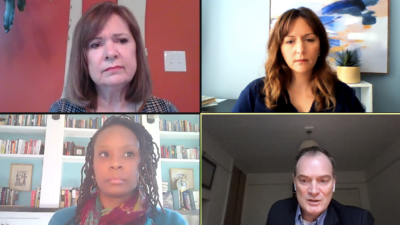Across party lines, voters nationally and in swing states like North Carolina recognize that the early years are a critical time to invest in the education of young children and their families – particularly in a year like this one. The pandemic has lifted the veil on a problem that has long existed: parents are struggling to afford and access high quality child care, and it is impacting the bottom line for families, businesses, and the state’s economy.
The NC Early Childhood Foundation (NCECF) hosted a webinar recently sharing the results of the First Five Years Fund’s (FFYF) latest voter poll and NCECF’s recent poll of North Carolina families with young children on topics surrounding child care and early learning. A panel then shared the impact the pandemic has had on North Carolina parents, child care teachers, and child care providers, as well as some of the history behind racial disparities in access to high quality early care and education. Moderated by Shanda Sumpter, early childhood education campaign manager at NC Child and owner of two child care centers, the panel included:
- Cassandra Brooks, owner and operator of Little Believer’s Academy Inc.
- Chanelle (C.C.) Croxton, North Carolina-organizing director for the National Domestic Workers Alliance.
- Dr. Devonya Govan-Hunt, president of the Black Child Development Institute – Charlotte.
Muffy Grant, executive director of the NC Early Childhood Foundation, kicked off the conversation by sharing the high-level takeaways from NCECF’s recent survey on how families are navigating child care and work before and during COVID-19:
- Access to care in child care centers has fallen since the pandemic began.
- Child care support from employers is rare.
- Affordable, accessible, high-quality care is out of reach for many parents.
- The pandemic has made already high-cost child care out of reach for many more families.
- Families of color experience more barriers to early care and education than white families.
- Rural disparities in access exist.
The accompanying report analyzes the economic impact of the lack of sufficient child care on families, businesses, and North Carolina’s state economy. The top-line economic result? North Carolina was already losing $2.4 billion per year prior to the pandemic due to insufficient access to child care, and that figure has increased to $2.9 billion during the pandemic. Check out this infographic to learn how that economic pain is divvied up among families, businesses, and the state economy.
In this video clip, Grant shares the “double bind” that families are in when it comes to accessing child care.
Next up, Charlie Joughin, communications director of FFYF, shared the results of FFYF’s recent national voter poll that oversampled eight swing states, including North Carolina. Key takeaways from the voter poll are shared below, along with a few short video clips.
- The coronavirus has had a big impact on work and family situations for roughly two-thirds of voters.
- Nearly half of parents say their current child care situation is only a short-term solution or is not working well right now.
- A majority of voters say the COVID-19 crisis has shown us how essential it is that we build a child care system that makes child care available and affordable to all families who need it.
In the below video clip, Joughin shares that majorities would like Congress to do more for working parents and for child care providers — on par with healthcare workers — and that most voters continue to believe that federal funding for early education should be increased.
- Voters are worried that child care businesses could close due to COVID-19 unless providers receive financial help.
- Voters are very concerned about the potential outcomes of losing affordable child care.
In the below video clip, Joughin shares the percentage of voters who say high-quality, affordable child care is very important to getting the economy going, and that most voters consider child care an essential service that will help strengthen the workforce and needs to be built up.
- There is strong support for federal funding that would ensure every working parent who wants to do so could affordably send their child to the high-quality child care, early learning or pre-kindergarten program of their choice, with the amount that parents would pay based on their income, with the lowest-income families paying low or no cost.
- Two in five voters would be more likely to support their member of Congress if he/she supports funding for early education, with virtually no political downside.
In this video clip, Joughin shares what percentage of voters agree that publicly funded care and education should start during the first five years of a child’s life.
The second half of the webinar was a panel discussion that illustrated how the pandemic is playing out for children, families, early educators, and providers of child care services in North Carolina. The following video clips show some of the key points made by the panelists:
Dr. Devonya Govan-Hunt explained the two pandemics facing Black children and their families, and clarified that COVID-19 did not create all the obstacles to high quality early care and education that Black families are facing today.
C.C. Croxton spoke to how essential early educators are to keeping the economy running during the pandemic and how they do not get the respect that they deserve for the important work they have been doing.
Cassandra Brooks spoke to the impact of the pandemic:
On child care providers, many of whom have had to shut down.
On young children and their families in her child care center, who are experiencing more pressures than ever.
On early educators, due to low wages, lack of health insurance, and encountering COVID-19 on the job.
Govan-Hunt also spoke to the important role family, friend and neighbor care, and family child care homes play in providing culturally competent early education.
Croxton spoke to the contradiction in the response to the pandemic, with a slow health care response on one hand, but also some intentional, successful policies put in place by North Carolina’s Division of Child Development and Early Education (DCDEE) to support child care providers, teachers, and parents during the crisis.
Panel moderator Shanda Sumpter wrapped up the discussion by sharing that collaborative conversations are underway to reimagine the early care and education system in North Carolina.
You can access the recording of the full webinar here.







